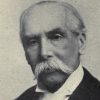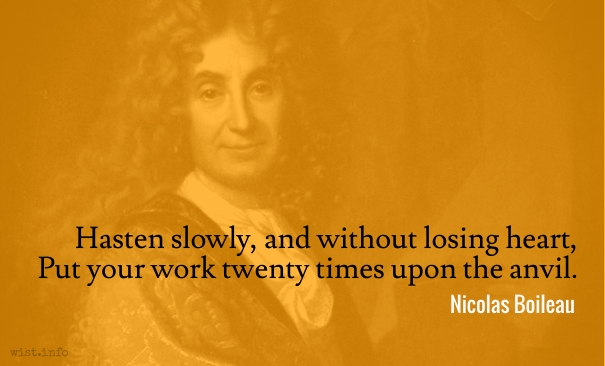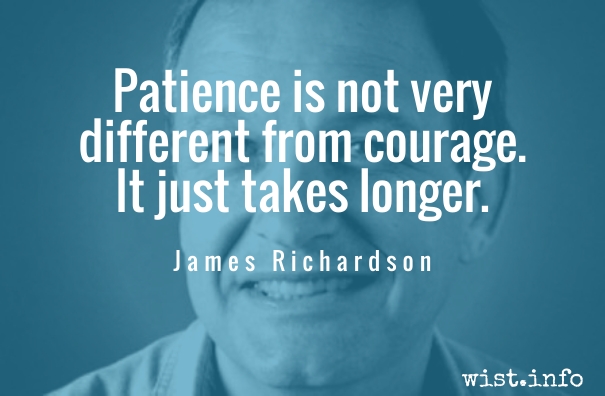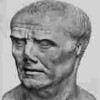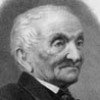Love should be the vestal fire of some mighty temple — some vast dim fane whose organ music is the rolling of the spheres. Affection will burn cheerily when the white flame of love is flickered out. Affection is a fire that can be fed from day to day, and be piled up ever higher as the winter years draw nigh. Old men and women can sit by it with their thin hands clasped, the little children can nestle down in front, the friend and neighbour has his welcome corner by its side, and even shaggy Fido and sleek Titty can toast their noses at the bars.
Let us heap the coals of kindness upon that fire. Throw on your pleasant words, your gentle pressures of the hand, your thoughtful and unselfish deeds. Fan it with good humour, patience, and forbearance. You can let the wind blow and the rain fall unheeded then, for your hearth will be warm and bright, and the faces round it will make sunshine in spite of the clouds without.Jerome K. Jerome (1859-1927) English writer, humorist [Jerome Klapka Jerome]
Idle Thoughts of an Idle Fellow, “On Being in Love” (1886)
(Source)
Quotations about:
patience
Note not all quotations have been tagged, so Search may find additional quotes on this topic.
When, O Catiline, do you mean to cease abusing our patience? How long is that madness of yours still to mock us? When is there to be an end of that unbridled audacity of yours, swaggering about as it does now?
[Quo usque tandem abutere, Catilina, patientia nostra? Quam diu etiam furor iste tuus nos eludet? Quem ad finem sese effrenata iactabit audacia?]
Marcus Tullius Cicero (106-43 BC) Roman orator, statesman, philosopher
Orationes in Catilinam [Catilinarian Orations], No. 1, § 1, cl. 1 (1.1.1) (63-11-08 BC) [tr. Yonge (1856)]
(Source)
Urging Catiline, leader of a conspiracy against the Roman government, to leave the city.
(Source (Latin)). Alternate translations:
How long, Catiline, will you abuse our patience? How long shall that fury of yours hector down even us too? To what bound shall your unbridled Audaciousness fly out?
[tr. Wase (1671)]
How long, Catiline, will you dare to abuse our patience? how long are we to be the sport of your frantic fury? to what extremity do you mean to carry your unbridled insolence?
[tr. Sydney (1795)]
How far at length, O Catiline! wilt thou trifle with our patience? How long still shall that frenzy of thine baffle us? To what limit shall they uncurbed effrontery boastfully display itself?
[tr. Mongan (1879)]
How far at length wilt thou abuse with our patience, O Catiline? How long also that thy fury will elude us? To what end thy unbridled audacity will boast itself?
[tr. Underwood (1885)]
How much further, Catilina, will you carry your abuse of our forbearance? How much longer will your reckless temper baffle our restraint? What bounds will you set to this display of your uncontrolled audacity?
[tr. Blakiston (1894)]
How far at length will you abuse, O Catiline, our patience? How long also will that fury of yours elude us? To what end will that unbridled audacity flaunt itself?
[tr. Dewey (1916)]
In the name of heaven, Catilina, how long do you propose to exploit our patience? Do you really suppose that your lunatic activities are going to escape our retaliation for evermore? Are there to be no limits to this audacious, uncontrollable swaggering?
[tr. Grant (1960)]
How far will you continue to abuse our patience, Catiline? For how much longer will that rage of yours make a mockery of us? To what point will your unbridled audacity show itself?
[IB Notes]
It [political opposition] is like dancing with a bear. When you’re dancing with a bear, you can’t get tired and sit down. You have to wait for the bear to get tired.
Joycelyn Elders (b. 1933) American pediatrician, public health administrator, academic
Keynote Speech, Sistersong Conference, Chicago (2007-06-03)
(Source)
If you look for rest in this life, how will you attain to everlasting rest? Dispose yourself, then, not for much rest but for great patience.
[Si quæris in hac vita requiem: quomodo tunc pervenies ad æternam requiem? Non ponas te ad multam requiem, sed a magnam patientiam.]Thomas à Kempis (c. 1380-1471) German-Dutch priest, author
The Imitation of Christ [De Imitatione Christi], Book 3, ch. 35, v. 3 (3.35.2) (c. 1418-27) [tr. Croft/Bolton (1940)]
(Source)
(Source (Latin)). Alternate translations:
If thou seek rest in this life, how then shalt thou come to the rest everlasting? Set not thyself to have rest here, but to have patience.
[tr. Whitford/Raynal (1530/1871)]
If you seek rest in this life, how will you, then, come to everlasting rest? Do not determine to have rest here, but to have patience.
[tr. Whitford/Gardiner (1530/1955)]
If thou seekest rest in this world, how wilt thou then attain to everlasting rest? Give not thy selfe to much ease, but to much patience.
[tr. Page (1639), 3.35.6]
If then these are the Conditions of thy Obedience and Reward, think how absurd it, for them who indulge their Ease here, to expect Peace and Happiness hereafter. In one of the two States Enduring must be thy Lot; and therefore tough Patience, and not soft Repose, is what thou should'st labour for at present.
[tr. Stanhope (1696; 1706 ed.), 3.40]
If thou seekest rest in this life, how wilt thou attain to the everlasting rest of the life to come? Thou must prepare thy heart for the exercise of many and great troubles, not for the enjoyment of continual rest.
[tr. Payne (1803), 3.27.8]
If thou seek rest in this life, how wilt thou then attain to the everlasting Rest? Dispose not thyself for much rest, but for great patience.
[ed. Parker (1841)]
It thou seekest rest in this life, how wilt thou attain to the everlasting rest of the life to come? Thou must not merely rest, but prepare thy heart for far greater patience and resignation.
[tr. Dibdin (1851), 3.31.2]
If thou seekest rest in this life, how then wilt thou come to the rest everlasting? Dispose not thyself for much rest, but for much patience.
[ed. Bagster (1860)]
If thou seek rest in this life, how then wilt thou attain unto the rest which is eternal? Set not thyself to attain much rest, but much patience.
[tr. Benham (1874)]
If thou seek rest in this life, how wilt thou then attain to the everlasting rest? Dispose not thyself for much rest, but for great patience.
[tr. Anon. (1901)]
If you search after rest in this life, how then will you come through to an everlasting rest? Do not set out for much in the way of rest, but for suffering that costs.
[tr. Daplyn (1952)]
If you look for rest in this life, how can you attain eternal rest? Dispose yourself not to rest, but to patient endurance.
[tr. Sherley-Price (1952)]
If you try to find rest in this world, how will you ever reach that rest which is life everlasting? It is not long hours of rest you must be prepared for here, but for long hours of patient endurance.
[tr. Knox-Oakley (1959)]
If you are looking for rest in this life, how will you ever reach the everlasting rest at the end? It is not rest you must expect, but suffering.
[tr. Knott (1962)]
You may seek rest in this life. How then will you gain rest in everlasting life? Do not expect great rest. Expect much suffering instead.
[tr. Rooney (1979)]
If you seek rest in this life, how do you expect to come to eternal rest? Do not make frequent rest your goal but great patience.
[tr. Creasy (1989)]
When I was young I was amazed at Plutarch’s statement that the elder Cato began at the age of eighty to learn Greek. I am amazed no longer. Old age is ready to undertake tasks that youth shirked because they would take too long.
W. Somerset Maugham (1874-1965) English novelist and playwright [William Somerset Maugham]
The Summing Up, ch. 73 (1934)
(Source)
And if we do but watch the hour,
There never yet was human power
Which could evade, if unforgiven,
The patient search and vigil long
Of him who treasures up a wrong.
So everything that slows us down and forces patience, everything that sets us back into the slow circles of nature, is a help. Gardening is an instrument of grace.
May Sarton (1912-1995) Belgian-American poet, novelist, memoirist [pen name of Eleanore Marie Sarton]
Journal of a Solitude (1973)
(Source)
I am the world’s original gradualist. I just think ninety-odd years is gradual enough.
Thurgood Marshall (1908-1993) American lawyer, US Supreme Court Justice (1967-1991)
Quoted in I. F. Stone’s Weekly (19 May 1958)
(Source)
In response to Eisenhower's speech to the National Newspaper Publishers Association, where the President called for "patience and forbearance" on civil rights reform.
Also that year, during the effort by Autherine Lucy to be admitted to the segregated University of Alabama, Marshall similarly quipped, "Maybe you can't override prejudice overnight, but the Emancipation Proclamation was issued in 1864, ninety-odd years ago. I believe in gradualism, and I also believe that ninety-odd years is pretty gradual."
I do not deny that pain is painful — otherwise, why would bravery be desired? But I do say that it is suppressed through patience, if we possess any amount at all. If we have none, then why do we raise philosophy on high and robe ourselves in its glory?
[Non ego dolorem dolorem esse nego — cur enim fortitudo desideraretur? — sed eum opprimi dico patientia, si modo est aliqua patientia: si nulla est, quid exornamus philosophiam aut quid eius nomine gloriosi sumus?]
Marcus Tullius Cicero (106-43 BC) Roman orator, statesman, philosopher
Tusculan Disputations [Tusculanae Disputationes], Book 2, ch. 14 (2.14) / sec. 33 (45 BC) [tr. @sentantiq (2020)]
(Source)
Original Latin. Alternate translations:
I do not deny Pain to be Pain, for what need else were there of Fortitude? but I say it may be suppress'd by Patience, if there be any such Virtue as Patience; if there be none, why do we magnifie Philosophy? or why do we value our selves in being denominated from her?
[tr. Wase (1643)]
I do not deny pain to be pain, for were that the case, in what would courage consist? but I say it should be assuaged by patience, if there be such a thing as patience: if there be no such thing, then why do we speak so in praise of philosophy? or why do we glory in its name?
[tr. Main (1824)]
That pain is pain, I do not deny; for why should fortitude be desired? but I say it is kept under by patience: -- if, at least, there be any patience. If there be no such thing, why do we extol philosophy? or why do we glory in her name?
[tr. Otis (1839)]
I do not deny pain to be pain; for were that the case, in what would courage consist? but I say it should be assuaged by patience, if there be such a thing as patience: if there be no such thing, why do we speak so in praise of philosophy? or why do we glory in its name?
[tr. Yonge (1853)]
I do not deny that pain is pain; else where were the need of fortitude? But I do say that pain is subdued by patience, if patience be a real quality; and if it be not, why do we lavish praises on philosophy? Or what is there to boast of in its name?
[tr. Peabody (1886)]
I don't deny that pain is pain -- otherwise why should there be felt a need for courage? But I say that it is overcome by endurance if only there is such a thing as endurance: if there isn't, why do we sing the praises of philosophy, or why are we boastful on its behalf?
[tr. Douglas (1990)]
Pity the poor bore. He stands among us as a creature formidable and familiar yet in essence unknowable. We can read of the ten infallible signs whereby he may be recognized and of the seven tested methods whereby he may be rebuffed. Valuable monographs exist upon his dress and diet; the study of his mating habits and migrational routes is well past the speculative stage; and statistical studies abound. One out of three hundred and twelve Americans is a bore, for instance, and a healthy adult male bore consumes each year one and a half times his own weight in other people’s patience.
John Updike (1932-2009) American writer
“Confessions of a Wild Bore,” Assorted Prose (1965)
(Source)
Shake and shake
The catsup bottle,
None will come,
And then a lot’ll.
For there is no gardening without humility, an assiduous willingness to learn, and a cheerful readiness to confess you were mistaken. Nature is continually sending even its oldest scholars to the bottom of the class for some egregious blunder. But, by the due exercise of patience and diligence, they may work their way to the top again.
Alfred Austin (1835-1913) English poet, UK Poet Laureate (1986-1913)
The Garden That I Love, “April 30th” (1894)
(Source)
If everyone were clothed with integrity,
If every heart were just, frank, kindly,
The other virtues would be well-nigh useless,
Since their chief purpose is to make us bear with patience
The injustice of our fellows.Si de probité tout était revêtu,
Si tous les cœurs était francs, justes et dociles,
La plupart des vertus nous seraient inutiles,
Puisqu’on en met l’usage à pouvoir sans ennui
Supporter dans nos droits l’injustice d’autrui.Molière (1622-1673) French playwright, actor [stage name for Jean-Baptiste Poquelin]
Le Misanthrope, Act 5, sc. 1, l. 1564 (1666) [tr. Wormeley (1894)]
(Source)
Original French.
Alt. trans. [Page (1913)]If everything were clothed in probity,
If all men's hearts were open, just, gentle,
Most of our virtues would be wholly useless,
Since we employ them now, in cheerfully
Enduring wrong, with right on our side.
A mule will work for you ten years for the privilege of kicking you once.
William Faulkner (1897-1962) American novelist
The Wild Palms [If I Forget Thee, Jerusalem], (Ch. 6) “Old Man” (1939)
(Source)
Variant: "... [V]indictive and patient (it is a known fact that he will labor ten years willingly and patiently for you, for the privilege of kicking you once) ...." (Sartoris (1929))
It may well be that we will have to repent in this generation. Not merely for the vitriolic words and the violent actions of the bad people, but for the appalling silence and indifference of the good people who sit around and say, “Wait on time.”
You sit at the board and suddenly your heart leaps. Your hand trembles to pick up the piece and move it. But what chess teaches you is that you must sit there calmly and think about whether it’s really a good idea and whether there are other, better ideas.
Hasten slowly, and without losing heart,
Put your work twenty times upon the anvil.[Hâtez-vous lentement ; et, sans perdre courage,
Vingt fois sur le métier remettez votre ouvrage.]
You see, fellow-soldiers, that perseverance is more prevailing than violence, and that many things which cannot be overcome when they are together, yield themselves up when taken little by little.
Quintus Sertorius (c. 123-72 BC) Roman statesman and general
In Plutarch, Parallel Lives, “Sertorius,” sec. 16 [Dryden ed. (1693)]
(Source)
Alt. trans.: "You see, fellow-soldiers, that perseverance is worth more than energy, and that many things that cannot be overcome when they are together, yield themselves up when taken little by little."
I think perhaps we want a more conscious life. We’re tired of drudging and sleeping and dying. We’re tired of seeing just a few people able to be individualists. We’re tired of always deferring hope till the next generation. We’re tired of hearing politicians and priests and cautious reformers (and the husbands!) coax us, “Be calm! Be patient! Wait! We have the plans for a Utopia already made; just wiser than you.” For ten thousand years they’ve said that. We want our Utopia now — and we’re going to try our hands at it.
Sinclair Lewis (1885-1951) American novelist, playwright
Main Street, ch. 16 [Carol] (1920)
(Source)
We have borne patiently a great deal of wrong, on the consideration that if nations go to war for every degree of injury, there would never be peace on earth. But when patience has begotten false estimates of it’s motives, when wrongs are pressed because it is believed they will be borne, resistance becomes morality.
Thomas Jefferson (1743-1826) American political philosopher, polymath, statesman, US President (1801-09)
Letter to Anne-Louise-Germaine Necker, Baronne de Staël-Holstein (16 Jul 1807)
(Source)
I’ll not willingly offend,
Nor be easily offended;
What’s amiss I’ll strive to mend,
And endure what can’t be mended.Isaac Watts (1674-1748) English theologian and hymnodist
Poems, “Moral Songs: #6 Good Resolutions”
(Source)
In Samuel Johnson, Works of English Poets, vol. 46 (1779)
I’ve learned that you can tell a lot about a man by the way he handles these three things: a rainy holiday, lost luggage, and tangled Christmas tree lights.
H. Jackson "Jack" Brown, Jr. (b. 1940) American writer
Live and Learn and Pass It On (1991)
Attributed by Brown to a 52-year old person. Often misattributed (with the phrase "rainy day") to Maya Angelou. For more see here.
Life has no other discipline to impose, if we would but realize it, than to accept life unquestioningly. Everything we shut our eyes to, everything we run away from, everything we deny, denigrate, or despise, serves to defeat us in the end. What seems nasty, painful, evil, can become a source of beauty, joy, and strength, if faced with an open mind. Every moment is a golden one for him who has the vision to recognize it as such.
Man’s greatest strength is shown in standing still.
Edward Young (1683-1765) English poet
The Complaint: Or, Night Thoughts, Vol. 2, No. 8 “Night the Eighth: Virtue’s Apology,” l. 922 (1745-03) (1748)
(Source)
The drops of rain make a hole in the stone, not by violence, but by oft falling.
[Gutta cavat lapidem, non vi, sed saepe cadendo.]
(Other Authors and Sources)
Latin proverb
Alt. trans.:
- "The rain dints the hard stone, not by violence, but by oft-falling drops."
- "The drop of rain maketh a hole in the stone, not by violence, but by oft falling."
- "The drop hollows out the stone not by strength, but by constant falling."
- "The drop hollows the stone, not with force but by falling often."
- "Dripping water hollows out the stone not by force, but by continually falling."
Some famous usages include Lucretius, De rerum natura, Book 6, l. 312: "The ring on the finger is tapered by being worn, the dripping water hollows out the stone, the plow is subtly worn by the impact of the fields." [anulus in digito subter tenuatur habendo, stilicidi casus lapidem cavat, uncus aratri, ferreus occulte decrescit vomer in arvis]
Similarly Ovid, Ex Ponte, 4.10.5: "The drop hollows out the stone, the ring is worn by use, and the curved ploughshare is rubbed away by the pressure of the earth." [Gutta cavat lapidem, consumitur annulus usu, et teritur pressa vomer aduncus humo.]
Made famous in English by Hugh Latimer, "Seventh Sermon before Edward VI" (1549). Similarly, John Lyly, Euphues (1580): "The soft droppes of rain perce the hard marble; many strokes overthrow the tallest oaks."
Keep strong, if possible. In any case, keep cool. Have unlimited patience. Never corner an opponent, and always assist him to save face. Put yourself in his shoes — so as to see things through his eyes. Avoid self-righteousness like the devil — nothing is so self-blinding.
A Physician is not angry at the Intemperance of a mad Patient; nor does he take it ill to be railed at by a Man in a Fever: Just so should a wise Man treat all Mankind, as a Physician does his Patient; and looking upon them only as sick, and extravagant.
Seneca the Younger (c. 4 BC-AD 65) Roman statesman, philosopher, playwright [Lucius Annaeus Seneca]
Moral Essays, “Of Anger [De ira]“
(Source)
When I had the strength, I did not have the patience. I have the patience today and I no longer have the power.
Joseph Joubert (1754-1824) French moralist, philosopher, essayist, poet
Pensées [Thoughts], 1812 (1850 ed.) [tr. Auster (1983)]
(Source)
Not found in other collections.
The best thing to give to your enemy is forgiveness; to an opponent, tolerance; to a friend, your heart; to your child, a good example; to a father, deference; to your mother, conduct that will make her proud of you; to yourself, respect; to all men, charity.
Clara Lucas Balfour (1808-1878) English novelist, lecturer, temperance campaigner
Sunbeams for All Seasons: Counsels, Cautions, and Precepts (1861 ed.)
IAGO: How poor are they that have not patience!
What wound did ever heal but by degrees?William Shakespeare (1564-1616) English dramatist and poet
Othello, Act 2, sc. 3, l. 391ff (2.3.391-392) (1603)
(Source)
Strive to be patient; bear with the faults and frailties of others, for you, too, have many faults which others have to bear. If you cannot mould yourself as you would wish, how can you expect other people to be entirely to your liking?
[Stude patiens esse in tolerando aliorum defectus, et qualescumque infirmitates, quia et tu multa habes, quæ ab aliis oportet tolerari. Si non potes te talem facere qualem vis, quomodo poteris alium habere ad beneplacitum tuum?]
Thomas à Kempis (c. 1380-1471) German-Dutch priest, author
The Imitation of Christ [De Imitatione Christi], Book 1, ch. 16, v. 2 (1.16.2) (c. 1418-27) [tr. Sherley-Price (1952)]
(Source)
(Source (Latin)). Alternate translations:
Study always that thou mayest be patient in suffering of other men’s defaults, for thou hast many things in thee that others do suffer of thee: and if thou canst not make thyself to be as thou wouldst, how mayest thou then look to have another to be ordered in all things after thy will?
[tr. Whitford/Raynal (1530/1871)]
Study always to be patient in bearing other men's defects, for you have many in yourself that others suffer from you, and if you cannot make yourself be as you would, how may you then look to have another regulated in all things to suit your will?
[tr. Whitford/Gardiner (1530/1955)]
Endeavour thy selfe patiently to bear with any faults and infirmities of others, for that thou thy selfe hast many things that must be borne withall by others. If thou canst not make thy selfe such a one as thou wouldst be, how canst thou expect to have another to thy liking in all things?
[tr. Page (1639), 1.16.6-7]
Remember, that You also have many Failings of your own, by which the Patience of other People will have its turn of being exercised. And if you do (as certainly you cannot but) see this, think how unreasonable it is, to expect you should make others in all particulars, what you would have them to be; when you cannot so much as make your self, what you are sensible you ought to be.
[tr. Stanhope (1696; 1706 ed.)]
Endeavor, to be always patient of the faults and imperfections of others; for thou haft many faults and imperfections of thy own, that require a reciprocation of forbearance. If thou art not able to make thyself that which thou wishest to be, how canst thou expect to mould another in conformity to thy will?
[tr. Payne (1803), 1.16.3]
Endeavour to be patient in bearing with the defects and infirmities of others, of what sort soever they be; for that thyself also hast many [failings] which must be borne with by others. If thou canst not make thyself such an one as thou wouldest, how canst thou expect to have another in all things to thy liking?
[ed. Parker (1841)]
Endeavour to be always patient of the faults and imperfections of others, whatever they may be; for thou hast many faults and imperfection of thy own, that require forbearance from others. If thou art not able to make thyself that which thou wishest to be, how canst thou expect to mould another in conformity to thy will?
[tr. Dibdin (1851)]
Endeavour to be patient in bearing with defects and infirmities in others, of what kind soever; because thou also hast many things which others must bear with. If thou canst not make thyself such as thou wouldst, how canst thou expect to have another according to thy liking?
[ed. Bagster (1860)]
Endeavour to be patient in bearing with other men’s faults and infirmities whatsoever they be, for thou thyself also hast many things which have need to be borne with by others. If thou canst not make thine own self what thou desireth, how shalt thou be able to fashion another to thine own liking.
[tr. Benham (1874)]
Endeavour to be patient in bearing with the defects and infirmities of others, of what sort soever they be; for that thyself also hast many failings which must be borne with by others. If thou canst not make thyself such an one as thou wouldst, how canst thou expect to have another in all things to thy liking?
[tr. Anon. (1901)]
Try to bear patiently with the defects and infirmities of others, whatever they may be, because you also have many a fault which others must endure. If you cannot make yourself what you would wish to be, how can you bend others to your will?
[tr. Croft/Bolton (1940)]
Try to be patient in bearing with others’ failings and all kinds of weaknesses, for you too have many which must be put up with by others. If you cannot mould yourself exactly as you would, how can you get another to be satisfying to you?
[tr. Daplyn (1952)]
Yes, you do well to cultivate patience in putting up with the shortcomings, the various disabilities of other people; only think how much they have to put up with in you! When you make such a failure of organizing your own life, how can you expect everybody else to come up to your own standards?
[tr. Knox-Oakley (1959)]
Try to be patient in bearing with the failings and weaknesses of other people, whatever they may be. You too have many faults, which others have to endure. If you cannot make yourself the kind of person you wish, how can you expect to have someone else to your liking?
[tr. Knott (1962)]
Seek always to be tolerant of the shortcomings and failings of others. They also have much to tolerate in you. If you are unable to mould yourself as you wish, how can you expect others to conform to your liking?
[tr. Rooney (1979)]
Take pains to be patient in bearing all the faults and weaknesses of others, for you too have many flaws that others must put up with. If you cannot make yourself as you would like to be, how can you expect to have another person entirely to your liking?
[tr. Creasy (1989)]
Bear patiently with the Defects of others, and labor to amend thy own.
Thomas Fuller (1654-1734) English physician, preacher, aphorist, writer
Introductio ad Prudentiam, # 389 (1725)
(Source)
The idea is like the seed corn; it grows imperceptibly in secret. When I have invented or discovered the beginning of a song …, I shut up the book and go for a walk or take up something else; I think no more of it for perhaps half a year. Nothing is lost, though. When I come back to it again, it has unconsciously taken a new shape, and is ready for me to begin working at it.
Johannes Brahms (1833-1897) German composer and pianist
Conversation with George Henschel
(Source)
Quoted in a letter to Herr and Frau von Herzogenberg in Max Kalbeck, ed., the Brahms-Gesellschaft collection of correspondence, Vol. 2 [tr. Bryant (1909)], as cited in John Alexander Fuller-Maitland, Brahms, ch. 3 (1911).
HORATIO: Season your admiration for a while
With an attent ear, till I may deliver
Upon the witness of these gentlemen
This marvel to you.William Shakespeare (1564-1616) English dramatist and poet
Hamlet, Act 1, sc. 1, l. 201ff (1.1.201-204) (c. 1600)
(Source)
LEONATO: For there was never a philosopher
That could endure the toothache patiently.William Shakespeare (1564-1616) English dramatist and poet
Much Ado About Nothing, Act 5, sc. 1, l. 37ff (5.1.37-38) (1598)
(Source)
A Man who is a Master of Patience is Master of everything else.
George Savile, Marquis of Halifax (1633-1695) English politician and essayist
“Patience,” Political, Moral, and Miscellaneous Thoughts and Reflections (1750)
(Source)












